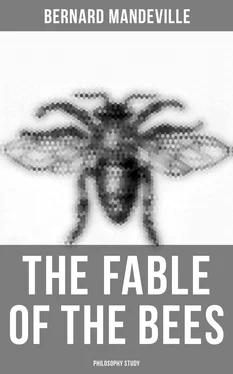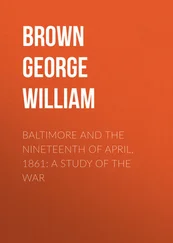As were’t unlawful, that one’s own,
Without a law-suit, should be known.
They kept off hearings wilfully, 65
To finger the refreshing fee;
And to defend a wicked cause,
Examin’d and survey’d the laws,
As burglar’s shops and houses do,
To find out where they’d best break through. 70
Physicians valu’d fame and wealth
Above the drooping patient’s health,
Or their own skill: the greatest part
Study’d, instead of rules of art,
Grave pensive looks and dull behaviour, 75
To gain th’ apothecary’s favour;
The praise of midwives, priests, and all
That serv’d at birth or funeral.
To bear with th’ ever-talking tribe,
And hear my lady’s aunt prescribe; 80
With formal smile, and kind how d’ye,
To fawn on all the family;
And, which of all the greatest curse is,
T’ endure th’ impertinence of nurses.
Among the many priests of Jove, 85
Hir’d to draw blessings from above,
Some few were learn’d and eloquent,
But thousands hot and ignorant:
Yet all pass’d muster that could hide
Their sloth, lust, avarice and pride; 90
For which they were as fam’d as tailors
For cabbage, or for brandy sailors,
Some, meagre-look’d, and meanly clad,
Would mystically pray for bread,
Meaning by that an ample store, 95
Yet lit’rally received no more;
And, while these holy drudges starv’d,
The lazy ones, for which they serv’d,
Indulg’d their ease, with all the graces
Of health and plenty in their faces. 100
The soldiers, that were forc’d to fight,
If they surviv’d, got honour by’t;
Though some, that shunn’d the bloody fray,
Had limbs shot off, that ran away:
Some valiant gen’rals fought the foe; 105
Others took bribes to let them go:
Some ventur’d always where ’twas warm,
Lost now a leg, and then an arm;
Till quite disabled, and put by,
They liv’d on half their salary; 110
While others never came in play,
And staid at home for double pay.
Their kings were serv’d, but knavishly,
Cheated by their own ministry;
Many, that for their welfare slaved, 115
Robbing the very crown they saved:
Pensions were small, and they liv’d high,
Yet boasted of their honesty.
Calling, whene’er they strain’d their right,
The slipp’ry trick a perquisite; 120
And when folks understood their cant,
They chang’d that for emolument;
Unwilling to be short or plain,
In any thing concerning gain;
For there was not a bee but would 125
Get more, I won’t say, than he should;
But than he dar’d to let them know,
That pay’d for’t; as your gamesters do,
That, though at fair play, ne’er will own
Before the losers that they’ve won. 130
But who can all their frauds repeat?
The very stuff which in the street
They sold for dirt t’ enrich the ground,
Was often by the buyers found
Sophisticated with a quarter 135
Of good-for-nothing stones and mortar;
Though Flail had little cause to mutter.
Who sold the other salt for butter.
Justice herself, fam’d for fair dealing,
By blindness had not lost her feeling; 140
Her left hand, which the scales should hold,
Had often dropt ’em, brib’d with gold;
And, though she seem’d impartial,
Where punishment was corporal,
Pretended to a reg’lar course, 145
In murder, and all crimes of force;
Though some first pillory’d for cheating,
Were hang’d in hemp of their own beating;
Yet, it was thought, the sword she bore
Check’d but the desp’rate and the poor; 150
That, urg’d by mere necessity,
Were ty’d up to the wretched tree
For crimes, which not deserv’d that fate,
But to secure the rich and great.
Thus every part was full of vice, 155
Yet the whole mass a paradise;
Flatter’d in peace, and fear’d in wars
They were th’ esteem of foreigners,
And lavish of their wealth and lives,
The balance of all other hives. 160
Such were the blessings of that state;
Their crimes conspir’d to make them great:
And virtue, who from politics
Has learn’d a thousand cunning tricks,
Was, by their happy influence, 165
Made friends with vice: And ever since,
The worst of all the multitude
Did something for the common good.
This was the state’s craft, that maintain’d
The whole of which each part complain’d: 170
This, as in music harmony
Made jarrings in the main agree,
Parties directly opposite,
Assist each other, as ’twere for spite;
And temp’rance with sobriety, 175
Serve drunkenness and gluttony.
The root of evil, avarice,
That damn’d ill-natur’d baneful vice,
Was slave to prodigality,
That noble sin; whilst luxury 180
Employ’d a million of the poor,
And odious pride a million more:
Envy itself, and vanity,
Were ministers of industry;
Their darling folly, fickleness, 185
In diet, furniture, and dress,
That strange ridic’lous vice, was made
The very wheel that turn’d the trade.
Their laws and clothes were equally
Objects of mutability! 190
For, what was well done for a time,
In half a year became a crime;
Yet while they altered thus their laws,
Still finding and correcting flaws,
They mended by inconstancy 195
Faults, which no prudence could foresee.
Thus vice nurs’d ingenuity,
Which join’d the time and industry,
Had carry’d life’s conveniences,
Its real pleasures, comforts, ease, 200
To such a height, the very poor  Liv’d better than the rich before. And nothing could be added more.
Liv’d better than the rich before. And nothing could be added more.
How vain is mortal happiness!
Had they but known the bounds of bliss; 205
And that perfection here below
Is more than gods can well bestow;
The grumbling brutes had been content
With ministers and government.
But they, at every ill success, 210
Like creatures lost without redress,
Curs’d politicians, armies, fleets;
While every one cry’d, damn the cheats,
And would, though conscious of his own,
In others barb’rously bear none. 215
One, that had got a princely store,
By cheating master, king, and poor,
Dar’d cry aloud, the land must sink
For all its fraud; and whom d’ye think
The sermonizing rascal chid? 220
A glover that sold lamb for kid.
The least thing was not done amiss,
Or cross’d the public business;
But all the rogues cry’d brazenly,
Good gods, had we but honesty! 225
Merc’ry smil’d at th’ impudence,
And others call’d it want of sense,
Always to rail at what they lov’d:
But Jove with indignation mov’d,
At last in anger swore, he’d rid 230
The bawling hive of fraud; and did.
The very moment it departs,
And honesty fills all their hearts;
There shows ’em, like th’ instructive tree,
Those crimes which they’re asham’d to see; 235
Which now in silence they confess,
By blushing at their ugliness:
Like children, that would hide their faults,
And by their colour own their thoughts:
Imag’ning, when they’re look’d upon, 240
That others see what they have done.
But, O ye gods! what consternation,
How vast and sudden was th’ alteration!
In half an hour, the nation round,
Meat fell a penny in the pound. 245
Читать дальше

 Liv’d better than the rich before. And nothing could be added more.
Liv’d better than the rich before. And nothing could be added more.










